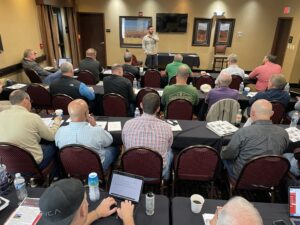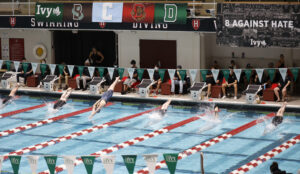
JACKSON, Tenn. (BP)–I spent my 40th birthday in the Nazi work camp at Flossenburg, Germany, near the Czech Republic border during the summer of 2003, walking with my family in silence through the gates of the camp to wander among the monuments and the levels of death.
Most of the camp has been cleared, but the barracks are still there, as is the oven building. The camp surrounds a staggered-level granite quarry and a beautiful garden has been planted throughout the grounds. Across the pit, I could see the only other visitors, an elderly couple walking deliberately past the memorials.
Around the quarry’s upper rim, a guard tower has been converted into a chapel steeple, a few yards down from the Jewish prayer house. At the center of the quarry’s floor is a huge mound of human ashes. Next to it is the “death triangle,” where prisoners were shot by firing squads. Near the oven is a wooden ramp used to shove the bodies into the oven, saving both time and effort.
As I walked, I thought many times of the camp’s most famous casualty: theologian Dietrich Bonhoeffer, who wrote “The Cost of Discipleship.” I also thought of other martyrs who have suffered so greatly in the face of persecution.
Near the oven, my wife whispered, “What a contrast with Neuschwanstein.”
Two days previously we had visited King Ludwig II’s fairy tale castle (the inspiration for Walt Disney’s “Cinderella” castle). The village where it is located was packed with tourists from all over the world. We paid to park, we paid to use the restrooms, and we paid for souvenirs. We had to purchase tickets for the tour well in advance, receiving an assigned time for our visit. We then had to climb a fairly steep hill to reach the castle gates and wait for our turn to enter.
To call the castle splendid is a tremendous understatement. The view of the Alpine lake and valley below. The magnificent artwork in each chamber. The fairy bridge over the gorge. Each turn of a corner took our breath away.
At least a half-dozen languages were being spoken around me, but I think each could be translated as, “Wow! What would it be like if I were the king (or queen) and this were my castle?”
At Flossenburg, however, I never once thought, “What would it be like if I were a doomed prisoner in this camp?” There were no lines of tourists there, no turnstiles, no fees to park. For most of the afternoon, I felt as though I were in a forgotten corner of the world. Since that afternoon, as I’ve read newspapers and watched the news, I’ve often felt as though Flossenburg and so many other atrocities have become forgotten pages of history.
How arrogant we humans are to walk through a castle and imagine ourselves as privileged royalty! How foolish we are to walk through a concentration camp and imagine that those “poor people” were not really like us. At Flossenburg, the prisoners were not all Jews; some were Christians (like me) and educated (like me) and sons (like me) and brothers (like me) and fathers (like me). They were individual persons, not massed, faceless groups.
As Ellie Wiesel has reminded us, 6 million Jews were not killed in the Holocaust; rather, a single Jew was killed by a single German 6 million times. Wiesel’s reminder, though, condemns humanity, not just Germany, for his reminder could just as easily say that a single person was killed by another person 6 million times over. All of humanity is blood-bound by suffering, oppression and fallen-ness.
History provides us with innumerable horror stories, from the countless millions of deaths in the Middle Passage of African slavery to Stalin’s bloody purges to the more recent horrors of Bosnia, Rwanda, Sudan and Congo. We live daily with Al Qaeda’s murderous threats and deeds.
On Jan. 27, 2005, the world commemorated the 60th anniversary of the liberation of the death camp at Auschwitz, with world leaders proclaiming they would do their best to make certain that the atrocities would never repeat themselves.
The reality is, however, that so many worldviews find expression in a willingness to kill. The essence of my Christian worldview, however, is not just a willingness to die, but also a willingness to lay down my life for others. This conviction draws directly from the sacrifice that Christ made on my behalf.
In Mark 12:31, Jesus cited Leviticus 19:18 as a part of the greatest commandment for His followers: “Thou shalt love thy neighbor as thyself.” What a tremendous ethical imperative that is, “Govern yourselves as though you and those around you are one and the same.” More often than not, we shrug our shoulders at the suffering of fellow persons and ask, “Am I my brother’s keeper?” We should realize with shame that we are quoting directly from Cain, history’s first perpetrator of a murderous atrocity.
As a middle-class American, my life really isn’t too far from that of King Ludwig in his castle. I live at ease in comfort. My lifestyle enables me to disengage from the lostness and suffering of the world. This insulation, however, violates Christ’s clear instructions. The moment when I forget that I am human, like the abused woman at the shelter or the foreigner in the turban, is the moment when I have forgotten that every person is my neighbor, and I am to love that person as I love myself. The same insulation causes me to ignore the persecution of Christ’s bride, the church, throughout the world. Such an attitude is in part what allows persecutions to continue over and over again, with people like me turning blind eyes and arrogant backs to the plights of so many persons.
In front of Flossenburg’s monument to the dead of Poland, that elderly couple approached my family. The woman pointed to my 5-year-old twins and said in broken English: “You teach them. This never happen again.” I could barely keep from crying as I saw the earnestness on her face and wondered what personal story she might tell about the camp.
Since I’m a college professor, I’ve taken to heart that elderly woman’s words, “You teach them.” I teach world literature each semester, and since my visit to Flossenburg, I’ve found a renewed passion for that course and for the Christian worldview that we employ here at Union University. In literature, we are confronted with the shared humanity of each person in this world. We all love and mourn, laugh and weep. We all need Christ’s grace. We all have stories to tell, and in those stories we should be led to see each woman as a daughter, a sister or a mother. Each man as a son, a father, or a brother. As a neighbor. As myself.
So that it will never happen again.
–30–
Gene C. Fant Jr., chairs the English department at Union University in Jackson Tenn. He and his wife, Lisa, are the authors of “Expectant Moments: Devotions for Expectant Couples” (Zondervan, 2002).















